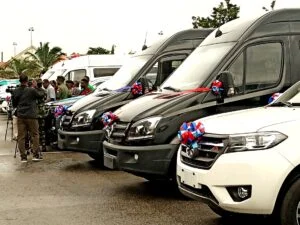The Minister of State for Defence, Bello Matawalle, has unveiled 84 Compressed Natural Gas (CNG)- powered Armed Forces vehicles comprising 20 buses, 50 Jet Lander pickup vehicles, and 14 Jet Mover Executive buses.
In his remarks, Matawalle said the initiative was a clear and strategic step in the nation’s journey towards energy sustainability, economic efficiency, and environmental resilience.
The conversion of the vehicles was done in collaboration with the Presidential CNG Initiative (Pi-CNG)
He said the inauguration of the vehicles was a direct fulfilment of President Bola Tinubu’s strategic vision to reposition Nigeria as a global player in clean energy adoption and to serve the public sector on the front line of climate-conscious governance.
According to him, there is an urgent call to adopt cleaner and more efficient alternatives in Nigeria, which is blessed with abundant natural gas reserves.
“It is, therefore, both logical and visionary, that we harness these God-given resources to power our means of transportation.
“By transitioning a version of Armed Forces vehicles to CNGP, while reducing operational fuel costs, it can play a role and contribute to the national effort.
“To cut down these greenhouse gas emissions and meet our global environmental objectives, we are also demonstrating innovation and adaptability in military logistics and mobility,” he said.
Matawalle commended the military for leading the public sector transition to cleaner energy, saying the transition was not a one-off event, but the beginning of a long-term systematic change.
He called for a focus on building supporting infrastructure, including CNG refuelling stations across military bases, and training technological personnel to maintain their systems.
“The Armed Forces must plan to seamlessly integrate sustainability and sustainable energy solutions into logistic operations and procurement.
“We must make sure that the overall energy efficiency is the same as the general energy efficiency, and that the most important thing is the energy efficiency,” he added.
The Chief of Defence Staff (CDS), Gen. Christopher Musa, said the transition to CNG vehicles reflected the ongoing transformation within the armed forces.
He said this underscores their commitment to strengthening military infrastructure, enhancing operational efficiency, and embracing sustainable, forward-changing solutions by global best practices.
Musa said the milestone reflects a bold step in the nation’s commitment to environmental sustainability, energy security, and technological innovation.
He said the introduction of the CNG into the defence ecosystem demonstrated the Federal Government’s dedication to reducing carbon emissions, enhancing fuel efficiency, and ensuring cost-effective service delivery.
“In doing so, we enhance operational effectiveness while supporting national developmental goals.
The Coordinator of the P-CNGi Initiative, Mr Michael Oluwagbemi, said the armed forces have led from the front regarding adopting CNG from day one.
Oluwagbemi said the Nigerian Army was the first pilot project of the P-CNGi Initiative, which converted 30 vehicles and had been expanded to 100.
He said a training and conversion programme would see over 5,000 vehicles of army personnel converted to CNG engines.



